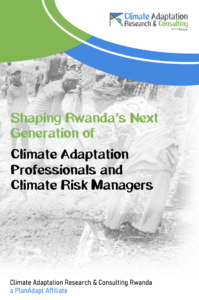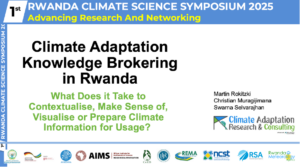 Climate Adaptation Research & Consulting (CARC) – a PlanAdapt Affiliate
Climate Adaptation Research & Consulting (CARC) – a PlanAdapt Affiliate
Shaping Rwanda’s Next Generation of Climate Adaptation Professionals
Climate Adaptation Research & Consulting (CARC) is a Rwandan organization affiliated with PlanAdapt. It aims to collaborate with public, private, and non-profit organisations in Rwanda to develop skills and competencies for managing climate risks, benefiting climate-vulnerable families and households. Our Team is based in Kigali.
Our work is embedded in PlanAdapt’s global expertise and networks, leveraging its methodologies and international partnerships to enhance climate resilience efforts in Rwanda. While benefiting from PlanAdapt’s well-established organisational infrastructure and collective experience across multiple countries, our Rwandan team is locally driven, ensuring that adaptation solutions are contextually relevant and impactful.
 Our mission is to build the capacity of Rwanda’s next generation of climate adaptation professionals and researchers, support public institutions and other societal actors by fostering contextually informed technical capacity and contribute to planning and implementation efforts in sectors such as agricultural, food security, forestry, water, urban planning, infrastructure etc. with a view on integrating climate risk assessments and considerations.
Our mission is to build the capacity of Rwanda’s next generation of climate adaptation professionals and researchers, support public institutions and other societal actors by fostering contextually informed technical capacity and contribute to planning and implementation efforts in sectors such as agricultural, food security, forestry, water, urban planning, infrastructure etc. with a view on integrating climate risk assessments and considerations.
CARC’s activities will focus on:
- Capacity development and learning support services: Supporting the growth of a professional cadre and their skills in integrating and dealing with climate impacts in various sectors, e.g. public health, agriculture. Providing capacity development support to organisations that work in climate-sensitive sectors in Rwanda;
- Action-oriented research: Working alongside research actors, policy actors and implementers, to conduct and support research and assessments that focus on climate risks, impacts and vulnerabilities and the enhanced integration of research-for-impact approaches;
- Advisory services: Supporting public, private, and not-for-profit organisations in Rwanda in efforts to manage and make sense of climate risks in their specific contexts and sectors. This includes innovative approaches to monitor and evaluate the effectiveness of climate adaptation and resilience policies, strategies, projects, and more widely the integration of understanding derived from climate information, i.e. climate adaptation knowledge brokering;
- Networking and awareness raising: Spreading awareness of the benefits of inclusive and effective climate adaptation and resilience policies, strategies, projects and measures in collaboration with a wide range of Rwandan actors.

CARC’s model represents an alternative to a somewhat outdated model of fly-in-fly-out consulting and advisory services that have dominated approaches in development and international cooperation for a long time. While we foster a global community of experts, researchers and knowledge brokers (that Rwandan experts also become a member of), ‘external’ (often Global Northern) colleagues would change role and become advisors, mentors and backstoppers to national experts. Instead of flying in for delivery-focused short-term visits during which little capacity is retained in the country, other than the discrete deliverable, which often has a limited level of ownership.
Regular activities are as follows:
Climate Risk and Vulnerability Assessments
- Development of national, district, or sectoral climate risk assessments (multi-hazard, sector-specific, and multi-sector); downscaling and interpretation of climate model projections for local decision-making; identification of vulnerable populations, ecosystems, and assets using data-driven methods (e.g., GIS, remote sensing); Assessment of economic and social impacts of climate hazards
Climate Data and Information Systems
- Design, development, and maintenance of climate information services (CIS) and early warning systems, climate data collection and monitoring (weather stations, remote sensing); development of data portals, dashboards, and decision-support tools; Integration of indigenous/ traditional knowledge with scientific data.
Policy, Strategy, and Regulatory Frameworks
- Support to governments in the development or revision of National Adaptation Plans (NAPs) and related strategies; drafting or updating climate resilience policies, sectoral adaptation plans, and regulatory frameworks (e.g., building codes, land-use policies); integration of adaptation into disaster risk reduction (DRR), sustainable development, and infrastructure policies.
Feasibility Studies and Project Preparation
- Pre-feasibility and feasibility studies for climate-resilient infrastructure or ecosystem-based adaptation (EbA) projects; cost–benefit analyses and economic appraisal of adaptation measures; Environmental and social impact assessments (ESIAs) for adaptation projects; development of project concepts and full proposals for international climate funds (e.g., GCF, AF).
Capacity Building and Institutional Strengthening
- Training programmes for public officials, technical agencies, and local communities on climate risk management; development of guidelines, toolkits, and standard operating procedures (SOPs) for adaptation and resilience; strengthening institutional frameworks for multi-level coordination (national, subnational, community)
Monitoring, Evaluation, and Learning (MEL)
- Design of M&E frameworks and indicators for adaptation and resilience (aligned with international standards, e.g., Paris Agreement’s Global Goal on Adaptation); independent evaluations of adaptation programmes and funds; development of knowledge management systems and synthesis of lessons learned.
Nature-Based and Ecosystem-Based Solutions
- Design and implementation of ecosystem-based adaptation (mangrove restoration, watershed management); research and technical advice on nature-based solutions and co-benefits (biodiversity, livelihoods); monitoring of ecosystem health and service provision under climate stress.
Climate Finance and Investment Support
- Advisory services for accessing international climate finance (GCF, GEF, MDBs); development of investment plans and funding strategies for adaptation and resilience; support for private sector engagement and blended finance approaches.
CARC collaborates with essential institutions in the:
- Public Sector, e.g. Ministry of Environment, REMA (Rwanda Environment Management Authority)
- Funding Organisations (Rwanda Green Fund)
- Research Institutes (Global Green Growth Institute Rwanda, Vanguard Economics, International Growth Centre (IGC) Rwanda and various Rwandan Universities);
- Implementers (e.g. One Acre Fund, BRAC Rwanda, Rwanda Climate Change and Development Network (RCCDN); and
- Educational Institutions (University of Kigali, University of Rwanda, African Leadership University, African Institute for Mathematical Sciences (AIMS) etc.)
Our work in Rwanda will be guided by the Revised Green Growth and Climate Resilience Strategy (2022, see video), the National Climate and Nature Finance Strategy of Rwanda 2024-2030, Rwanda 2035 Rwanda’s 2035 Nationally Determined Contribution 3.0 (NDC 2025) and other related policies and strategies.
Please do get in touch if you work in Rwanda and share the same goals and ambitions! Please get in touch with us at info-carc(at)plan-adapt.org.
We are building a team in Kigali. Feel free to apply or share the vacancy announcement with suitable, potentially interested candidates!
